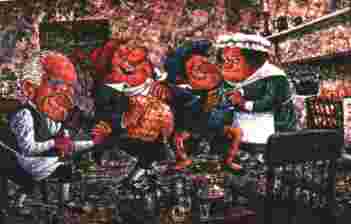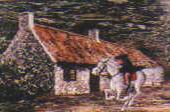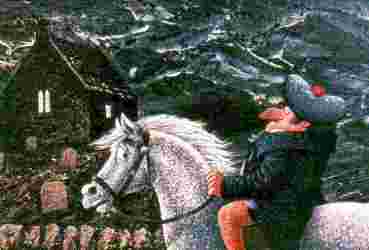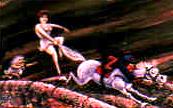Tam o' Shanter
A Tale
Of Brownyis and of Bogillis full is this Buke. Gawin Douglas.
Burns often prefaced his poems with quotations from the Bible or Pope. In this instance the quote from Gavin Douglas (1475?-1522) is from his translation of the Aenid (Eneados) This work was the first full length translation of a major classical text to be made anywhere in Britain and earns him a deserved place in the history of the Northern Rennaissance.
It shows just how well read Burns was in that he could pick a quote for each occassion.
Tam o'Shanter is Burns most sustained single poetic effort, as well as the only example among his poems of this kind of narrative poetry. It was written at a time when he was beset with all kinds difficulties and worries, after a spell of scanty production and it showed him to be a master of verse narrative as no Scots poet had been since the fifteenth century. The speed and verve of the narration, fine, flexible use of the octosyllabic couplet, the effective handling of the verse paragraph demonstrate a degree of craftsmanship that few other users of this verse form have achieved.
The first paragraph brings to life a bustling country town at the end of a busy market day. Although there is no mention of noise, we are somehow aware of the various sounds of the evening. The clatter of horse shoes, the jangling of harness and the press of many people. Almost at once, however, the poem marks the characteristically Scottish contrast between the wild weather outside and the snug fireside within. This introductory section, describing Tam drinking happily at the inn, has a structure of its own, and moves to a climax at the seventh verse paragraph. The first twelve lines give us first a brief but vivid impression of market day at a country town, with the evening closing in, and then an equally vivid picture of the farmer's wife waiting suspiciously at home for his return
When chapman billies leave the street
And drouthy neebors, neebors meet
As market-days are wearing late
An' folk begin to tak the gate
While we sit bousing at the nappy
An' getting fou and unco happy
We think na on the lang Scots miles
The mosses, waters, slaps, and styles
That lie between us and our hame
Whare sits our sulky sullen dame
Gathering her brows like gathering storm
Nursing her wrath to keep it warm.
There is a pause here, before Burns proceeds to nail the general description down by applying it to Tam o' Shanter, in four sturdy lines
This truth fand honest Tam o' Shanter
As he frae Ayr ae night did canter
(Auld Ayr, wham ne'er a town surpasses
For honest men and bonny lasses).
The parenthetical remark about auld Ayr and its inhabitant adds just the note of familiarity, of personal knowledge, that the mood of the poem requires. This is an anecdote told by someone who knows the hero and his environment; Tam becomes one of us, and the casual note of compliment to Ayr puts the reader, as it were, up at the bar, having a drink with the narrator.
The perspective shifts a little in the lines that follow. After another pause (and it should be noted how effectively Burns places his pauses and varies his tempo) the narrator takes the reader by the arm and moves with him to the rear of the pub, from which they look at the back of the unconscious Tam as he drinks at the bar with his cronies, and remind themselves of his faults and of his waiting wife
O Tam! had'st thou but been sae wise
As ta'en thy ain wife Kate's advice!
She tauld thee weel thou was a skellum
A blethering, blustering, drunken blellum
That frae November till October
Ae market-day thou was nae sober
That ilka melder wi' the miller
Thou sat as Lang as thou had siller
That ev'ry naig was ca'd a shoe on
The smith and thee gat roaring fou on
That at the Lord's house, even on Sunday
Thou drank wi' Kirkton Jean till Monday
She prophesied, that, late or soon
Thou would be found deep drown'd in Doon
Or catch'd wi' warlocks in the mirk
By Alloway's auld, haunted kirk
And as the narrator lets himself go in depicting Tam's wife's view of Tam (which becomes as it proceeds also our view of him), he breaks out with a somewhat beery generalization
Ah, gentle dames! it gars me greet
To think how mony counsels sweet
How mony lengthen'd sage advices
The husband frae the wife despises!
The narrator is lost for a moment in contemplation of the stupidity of men (of other men, that is). And all the time Tam, growing more and more unconscious of the demands of domesticity, morality, even self-preservation, is drinking happily at the bar with his cronies
But to our tale, Ae market-night
Tam had got planted unco right
Fast by an ingle, bleezing finely
Wi' reaming swats, that drank divinely
And at his elbow, Souter Johnny
His ancient, trusty, drouthy crony
Then comes the climax of good fellowship
Tam lo'ed him like a vera brither
They had been fou for weeks thegither
Here there is another pause, and then the narrator again describes how the hour is growing later and the night wilder
The night drave on wi' sangs and clatter
And ay the ale was growing better
The landlady and Tam grew gracious
Wi' favours, secret, sweet, and precious

The Souter tauld his queerest stories
The landlord's laugh was ready chorus
The storm without might rair and rustle
Tam did na mind the storm a whistle
And then we come to the climax of this interior and to the end of first section of the poem
Care, mad to see a man sae happy
E'en drown'd himsel amang the nappy
As bees flee hame wi' lades o' treasure
The minutes wing'd their way wi' pleasure
Kings may be blest, but Tam was glorious
O'er a' the ills o' life victorious!
The picture of the jovial interior is expanded, in a blaze of happy sympathy, into a celebration of Tam's mood. The double rhymes (happy and nappy treasure and pleasure) help to give the impression of a grand, carefree, snap of the fingers, while the final rhyming of "glorious" with "victorious" sounds a slightly drunken organ note which swells the climax of this account of Tam's state of mind.
There is a long pause now, and the echoes of that glorious and victorious die away in the reader's ears. Then, in a most interesting transitional passage, the tone is suddenly changed, and the narrator, using standard English and talking with deliberate sententiousness, brings the cold world of reality into this warm atmosphere. First, we have a series of deliberately poetic generalizations about the transitory nature of human pleasures, and the application is then punched home with a proverbial statement in simple, direct language and a return to Scots diction and to Tam
But pleasures are like poppies spread
You seize the flow'r, its bloom is shed
Or like the snow falls in the river
A moment white then melts for ever
Or like the borealis race
That flit ere you can point their place
Or like the rainbow's lovely form
Evanishing amid the storm
Nae man can tether time or tide
The hour approaches Tam maun ride
That hour, o' night's black arch the key-stane
That dreary hour Tam mounts his beast in
And sic a night he taks the road in
As ne'er poor sinner was abroad in.
Mr. Edwin Muir cites the eight lines in standard English as proof of his thesis that ever since the end of the Middle Ages the Scot, because of the peculiar linguistic and cultural situation in which he found himself, has had to feel in Scots and think in English. But it would have been easy for Burns to have found a number of Scots proverbial lines which would have expressed the thought conveyed by the lines about the poppies and the borealis.
The point here is not, surely, that the poet is introducing thought and must therefore employ standard English, but that he is being deliberate, cold, and formal, in order to contrast the unwelcome truth about pleasure with Tam's cosy feeling about it.
The English in these lines is a deliberately "fancy" English, piling up simile after simile as though to draw attention to the literary quality of the utterance. Mr. Muir's explanation of these lines takes no account of this very conscious poetic diction he sees it simply as English. Burns is seeking a form of expression which will set the sternness of objective fact against the warm, cosy, and self-deluding view of the half-intoxicated Tam, and he wants to do this with just a touch of irony.
What more effective device than to employ a deliberate neoclassic English poetic diction in these lines?
The next verse paragraph builds up the storm scene until it reaches the point where the name of the Devil can be introduced. The climactic couplet which concludes it rings out as a warning of supernatural terrors to come
The wind blew as 'twad blawn its last
The rattling showers rose on the blast
The speedy gleams the darkness swallow'd
Loud, deep, and lang the thunder bellow'd
That night, a child might understand
The Deil had business on his hand
We return to Tam and follow him as he rides thro' dub and mire crooning to himself to keep his courage up but not forgetting to look round
Weel mounted on his grey meare Meg
A better never lifted leg
Tam skelpit on thro' dub and mire
Despising wind, and rain, and fire

Whiles holding fast his guid blue bonnet
Whiles crooning o'er some auld Scots sonnet
Whiles glow'ring round wi' prudent cares
Lest bogles catch him unawares
And so he approaches the haunted kirk
Kirk-Alloway was drawing nigh
Whare ghaists and houlets nightly cry
We now move, after a pause, to another paragraph, in which Kirk AIloway is introduced as a climax of a series of horrors
By this time he was cross the ford
Whare, in the snaw, the chapman smoor'd
And past the birks and meikle stane
Whare drunken Charlie brak's neck-bane
And thro' the whins, and by the cairn
Whare hunters fand the murder'd bairn
And near the thorn, aboon the well
Whare Mungo's mither hang'd hersel
Before him Doon pours all his floods
The doubling storm roars thro' the woods
The lightnings flash from pole to pole
Near and more near the thunders roll
When, glimmering thro' the groaning trees
Kirk-Alloway seem'd in a bleeze
Thro' ilka bore the beams were glancing
And loud resounded mirth and dancing

Tam hears the sound of mirth and dancing coming from the kirk, and at this point Burns pauses, and breaks into an exclamation of wonder at the boldness which whisky can inspire.
This interruption effectively keeps the reader in suspense and gives him an excuse to dismiss, if he so wishes, all that Tam saw as the product of the man's drunken imagination. It is to be noted that Burns nearly always provided this out in his supernatural scenes, yet before the poem is over we find that he has made all details but one, Maggie's loss of her tail, capable of rational explanation. This set the formula used ever since in tales of the supernatural.
Inspiring bold John Barleycorn!
What dangers thou canst make us scorn!
Wi' tippeny, we fear nae evil
Wi' usquabae, we'll face the Devil
The swats sae ream'd in Tammie's noddle
Fair play, he car'd na deils a boddle
But Maggie stood, right sair astonish'd
Till, by the heel and hand admonish'd
She ventur'd forward on the light
Thus inspired, Tam presses forward, in spite of the reluctance of Maggie his mare
And, wow! Tam saw an unco sight!
This sharp, sudden, exclamatory line is very different in movement from the slower exclamation about the effects of whisky Inspiring bold John Barleycorn!
In the later line ( And Wow!) he is not halting the narrative to make a generalization but pressing forward into his tale in a mood of sudden excitement and astonishment. There follows immediately the eerie catalogue of what Tam saw
Warlocks and witches in a dance
Nae cotillion, brent new frae France
But hornpipes, jigs, strathspeys, and reels
Put life and mettle in their heels
A winnock-bunker in the east
There sat auld Nick, in shape o' beast
A towzie tyke, black, grim, and large
To gie them music was his charge
He screw'd the pipes and gart them skirl
Till roof and rafters a' did dirl
Coffins stood round, like open presses
That shaw'd the dead in their last dresses
And by some devilish cantraip slight
Each in its cauld hand held a light
By which heroic Tam was able
To note upon the haly table
A murderer's banes in gibbet airns
Twa span-lang, wee, unchristen'd bairns
A thief, new-cutted frae a rape
Wi' his last gasp his gab did gape
Five tomahawks, wi' blude red-rusted
Five scymitars, wi' murder crusted
A garter, which a babe had strangled
A knife, a father's throat had mangled
Whom his ain son o' life bereft
The grey hairs yet stack to the heft
wi' mair o' horrible and awefu'
Which even to name wad be unlawfu'
The note of superstitious terror is exaggerated here almost to the point of absurdity, and certainly to the point where some kind of humorous effect is achieved. Here is the devil of folklore, Auld Nick, surrounded by all his traditional properties. The objects described are so monstrously horrible that they are not quite real, like the setting of an eighteenth-century Gothic novel, and so a note of comic mockery emerges, as though Burns is gently laughing at people who could believe in such things. Yet this note does not lessen the suspense.
As Tammie glowr'd, amaz'd, and curious
The mirth and fun grew fast and furious
The piper loud and louder blew
The dancers quick and quicker flew
They reel'd, they set, they cross'd, they cleekit
Till ilka carlin swat and reekit
And coost her duddies to the wark
And linket at it in her sark
Tam all this while has remained motionless on his mare, watching the incredible scene, and the longer the description the more interested we become in finding out how Tam has reacted. But Burns deftly increases our suspense with another exclamation, one of a series planted effectively at intervals throughout the poem
Now, Tam, O Tam! had thae been queans
A' plump and strapping in their teens
Their sarks, instead o' creeshie flannen
Been snaw-white seventeen hunder linen!
Thir breeks o' mine, my only pair
That ance were plush, o' gude blue hair
I wad hae gi'en them off my hurdies
For ae blink o' the bonie burdies!
But wither'd beldams, auld and droll
Rigwoodie hags wad spean a foal
Lowping and flinging on a crummock
I wonder didna turn thy stomach
We return to Tam, whose discerning eye has picked out one of the witches as a "winsome wench and wawlie," though Burns makes clear in a parenthetical description of her that once she grew to her full witch status she would do serious damage in the countryside.
But Tam kend what was what fu' brawlie
There was ae winsome wench and wawlie
That night enlisted in the core
Lang after kend on Carrick shore
(For monie a beast to dead she shot
An' perish'd monie a bonie boat
And shook baith meikle corn and bear
And kept the country-side in fear.)
For a moment, however, the picture of Nannie dancing is human and strangely touching
Her cutty sark, o' Paisley harn
That while a lassie she had worn
In longitude tho' sorely scanty
It was her best, and she was vauntie

Ah! little kend thy reverend grannie
That sark she coft for her wee Nannie
Wi' twa pund Scots ('twas a' her riches)
Wad ever grac'd a dance of witches!
The suggestion of a fall from an earlier happy, human state gives a momentary flash of pathos to the narrative, but it is modified by humor and not sustained long enough to threaten the mood of the poem as a whole
The next verse paragraph describes Nannie's furious dancing, the verse getting faster and faster
But here my Muse her wing maun cour
Sic flights as far beyond her power
To sing how Nannie lap and flang
( A souple jad she was and strang)
And how Tam stood like ane bewitch'd
And thought his very een enrich'd
Even Satan glowr'd, and fidg'd fu' fain
And hotch'd and blew wi' might and main
Till first ae caper, syne anither
Tam tint his reason a' thegither
And roars out, "Weel done, Cutty-sark!"
And in an instant all was dark
And scarcely had he Maggie rallied
When out the hellish legion sallied
It is interesting that the change is described without taking a new paragraph, to begin a new paragraph after Tam's shout would be a pause between the shout and the resulting change, whereas the effect of sudden alteration is desired. So Burns describes the beginning of the witches' attack without taking breath and only after he has got the attack going does he pause. The next paragraph continues and elaborates the description of the pursuing witches and the fleeing Maggie
As bees bizz out wi' angry fyke
When plundering herds assail their byke
As open pussie's mortal foes
When, pop! she starts before their nose
As eager runs the market-crowd
When 'catch the thief' resounds aloud
So Maggie runs, the witches follow
Wi' money an eldritch skreech and hollow
At this moment of suspense Burns deliberately tantalizes the reader again by holding up the narrative while he wags his finger and shakes his head at Tam. The poet's mock-sympathetic confidence in his hero's doom has comic implications, which are reinforced by the imagery
Ah, Tam! Ah, Tam! thou'll get thy fairin!
In hell they'll roast thee like a herrin!
In vain, thy Kate awaits thy comin'
Kate soon will be a woefu' woman
Maggie pushes on, after that sudden slowing down, the verse gains speed again
Now, do thy speedy utmost, Meg
And win the key-stane of the brig
There, at them thou thy tail may toss
A running stream they dare na cross!
But ere the key-stane she could make
The fient a tail she had to shake
For Nannie, far before the rest
Hard upon noble Maggie prest
And flew at Tam wi' furious ettle
But little wist she Maggie's mettle
Tam and his mare gain the bridge, and safety, for witches cannot cross running water. But Nannie, pressing close behind, had removed poor Maggie's tail

Ae spring brought off her master hale
But left behind her ain grey tail
The carlin claught her by the rump
And left poor Maggie scarce a stump
There is an abrupt pause at this point. The story is now told, the poet's tone indicates that something more is to come. And, after the expectant pause, it does come a mock moral, a deliberately absurd oversimplification of the meaning of the tale to make it a warning against drinking and wenching
Now, wha this tale o' truth shall read
Ilk man and mother's son, take heed
Whene'er to drink you are inclin'd
Or cutty-sarks run in your mind
Think, ye may buy the joys o'er dear
Remember Tam o' Shanter's mare
And on that note of Remember! - like the speech of the ghost in Hamlet - the poem comes to an end.
Among the many qualities of Tam o' Shanter which show Burns technical skill in handling this kind of verse narrative - the effective use of the octosyllabic couplet, the variations in tempo, the use of the verse paragraph, and the placing of the pauses - perhaps the most remarkable is his handling of the tone of the poem.
The tone is at once comic and full of suspense, shrewd yet irresponsible, mocking yet sympathetic; there is a fine balance here between mere supernatural anecdote and the precisely etched realistic picture, as it is maintained throughout the poem.
Tam o' Shanter is the work of a virtuoso. Yet it is the only verse narrative of its kind that he wrote, the product (if tradition is to be trusted) of one day's truancy from the work and worries of his farm and his excise duties during one of his most troubled periods.
Clearly, with a little leisure and a little relief from the carking cares that continually pressed on him, many other new aspects of his poetic genius might have been as profitably explored.
It is easy to see why Burns, wiser than his Edinburgh advisers, continually longed for a government job which would leave him with some time of his own.
Tam O'Shanter features on my CD of Burns poems
The Greatest Poems in the World.
To read more about this Click Here.
For a prose translation of the poem and the story behind it being written
Tam O'Shanter translated
|